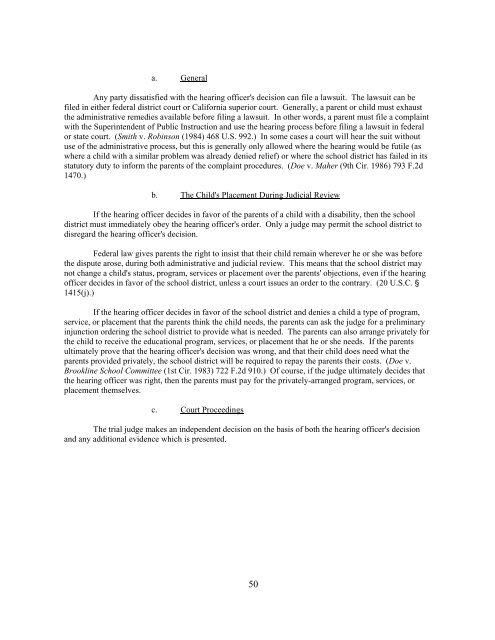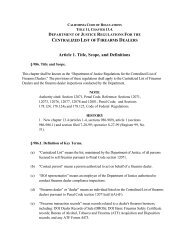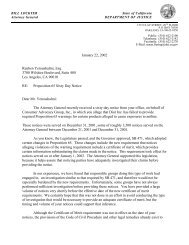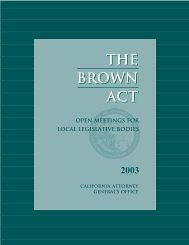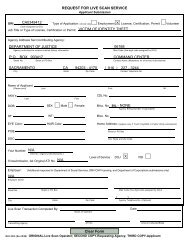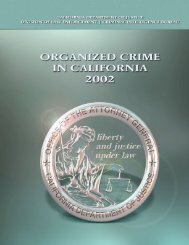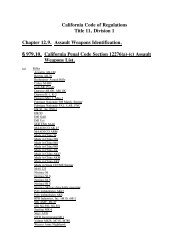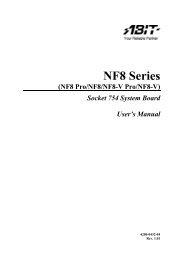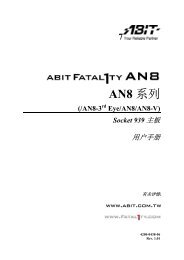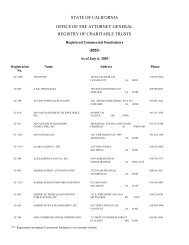Legal Rights of Persons With Disabilities - Ossh.com
Legal Rights of Persons With Disabilities - Ossh.com
Legal Rights of Persons With Disabilities - Ossh.com
You also want an ePaper? Increase the reach of your titles
YUMPU automatically turns print PDFs into web optimized ePapers that Google loves.
a. General<br />
Any party dissatisfied with the hearing <strong>of</strong>ficer's decision can file a lawsuit. The lawsuit can be<br />
filed in either federal district court or California superior court. Generally, a parent or child must exhaust<br />
the administrative remedies available before filing a lawsuit. In other words, a parent must file a <strong>com</strong>plaint<br />
with the Superintendent <strong>of</strong> Public Instruction and use the hearing process before filing a lawsuit in federal<br />
or state court. (Smith v. Robinson (1984) 468 U.S. 992.) In some cases a court will hear the suit without<br />
use <strong>of</strong> the administrative process, but this is generally only allowed where the hearing would be futile (as<br />
where a child with a similar problem was already denied relief) or where the school district has failed in its<br />
statutory duty to inform the parents <strong>of</strong> the <strong>com</strong>plaint procedures. (Doe v. Maher (9th Cir. 1986) 793 F.2d<br />
1470.)<br />
b. The Child's Placement During Judicial Review<br />
If the hearing <strong>of</strong>ficer decides in favor <strong>of</strong> the parents <strong>of</strong> a child with a disability, then the school<br />
district must immediately obey the hearing <strong>of</strong>ficer's order. Only a judge may permit the school district to<br />
disregard the hearing <strong>of</strong>ficer's decision.<br />
Federal law gives parents the right to insist that their child remain wherever he or she was before<br />
the dispute arose, during both administrative and judicial review. This means that the school district may<br />
not change a child's status, program, services or placement over the parents' objections, even if the hearing<br />
<strong>of</strong>ficer decides in favor <strong>of</strong> the school district, unless a court issues an order to the contrary. (20 U.S.C. '<br />
1415(j).)<br />
If the hearing <strong>of</strong>ficer decides in favor <strong>of</strong> the school district and denies a child a type <strong>of</strong> program,<br />
service, or placement that the parents think the child needs, the parents can ask the judge for a preliminary<br />
injunction ordering the school district to provide what is needed. The parents can also arrange privately for<br />
the child to receive the educational program, services, or placement that he or she needs. If the parents<br />
ultimately prove that the hearing <strong>of</strong>ficer's decision was wrong, and that their child does need what the<br />
parents provided privately, the school district will be required to repay the parents their costs. (Doe v.<br />
Brookline School Committee (1st Cir. 1983) 722 F.2d 910.) Of course, if the judge ultimately decides that<br />
the hearing <strong>of</strong>ficer was right, then the parents must pay for the privately-arranged program, services, or<br />
placement themselves.<br />
c. Court Proceedings<br />
The trial judge makes an independent decision on the basis <strong>of</strong> both the hearing <strong>of</strong>ficer's decision<br />
and any additional evidence which is presented.<br />
50


